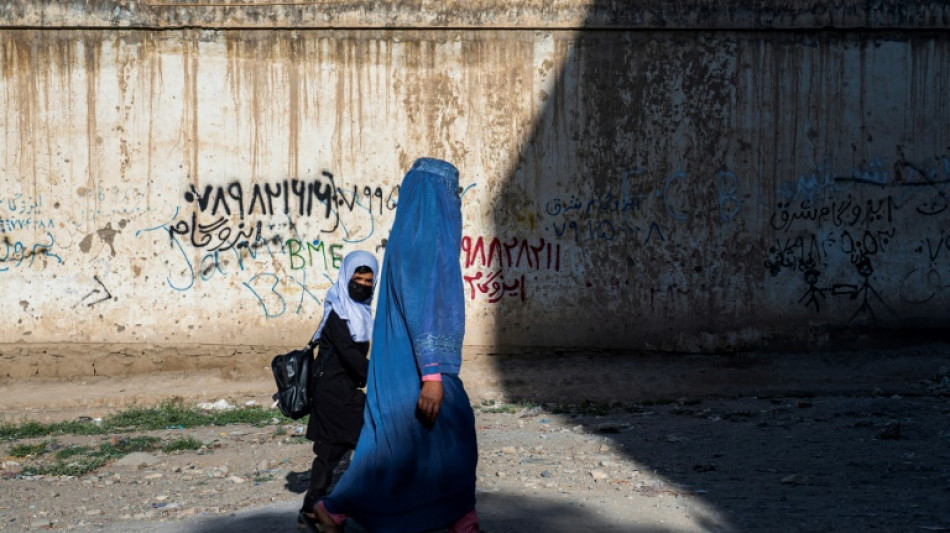
-
 Migrant's expulsion puts Washington Salvadorans on edge
Migrant's expulsion puts Washington Salvadorans on edge
-
Plan for expanded Muslim community triggers hope, fear in Texas

-
 Pakistan foreign minister due in Kabul as deportations rise
Pakistan foreign minister due in Kabul as deportations rise
-
White House touts Covid-19 'lab leak' theory on revamped site

-
 Dodgers star Ohtani skips trip to Texas to await birth of first child
Dodgers star Ohtani skips trip to Texas to await birth of first child
-
US senator says El Salvador staged 'margarita' photo op

-
 Ford 'adjusts' some exports to China due to tariffs
Ford 'adjusts' some exports to China due to tariffs
-
Thomas maintains two-shot lead at RBC Heritage

-
 US to withdraw some 1,000 troops from Syria
US to withdraw some 1,000 troops from Syria
-
Four killed after spring storms wreak havoc in the Alps

-
 Spurs' Popovich reportedly home and well after 'medical incident'
Spurs' Popovich reportedly home and well after 'medical incident'
-
Trump goes to war with the Fed

-
 Celtics chase second straight NBA title in playoff field led by Thunder, Cavs
Celtics chase second straight NBA title in playoff field led by Thunder, Cavs
-
White House site blames China for Covid-19 'lab leak'

-
 Norris edges Piastri as McLaren top Jeddah practice
Norris edges Piastri as McLaren top Jeddah practice
-
Trump warns US could ditch Ukraine talks if no progress

-
 Judge denies Sean 'Diddy' Combs push to delay trial
Judge denies Sean 'Diddy' Combs push to delay trial
-
80 killed in deadliest US attack on Yemen, Huthis say

-
 Lebanon says two killed in Israeli strikes in south
Lebanon says two killed in Israeli strikes in south
-
Trump says US will soon 'take a pass' if no Ukraine deal

-
 F1 success is 'like cooking' - Ferrari head chef Vasseur
F1 success is 'like cooking' - Ferrari head chef Vasseur
-
Cycling mulls slowing bikes to make road racing safer

-
 Macron invites foreign researchers to 'choose France'
Macron invites foreign researchers to 'choose France'
-
Klopp 'happy' in new job despite Real Madrid rumours: agent

-
 Alcaraz into Barcelona semis as defending champion Ruud exits
Alcaraz into Barcelona semis as defending champion Ruud exits
-
Vance meets Italy's Meloni before Easter at the Vatican

-
 Evenepoel returns with victory in Brabantse Pijl
Evenepoel returns with victory in Brabantse Pijl
-
Maresca confident he will survive Chelsea slump

-
 Mob beats to death man from persecuted Pakistan minority
Mob beats to death man from persecuted Pakistan minority
-
Lebanon says one killed in Israeli strike near Sidon

-
 Arsenal's Havertz could return for Champions League final
Arsenal's Havertz could return for Champions League final
-
US officials split on Ukraine truce prospects

-
 Client brain-dead after Paris cryotherapy session goes wrong
Client brain-dead after Paris cryotherapy session goes wrong
-
Flick demands answers from La Liga for 'joke' schedule

-
 'Maddest game' sums up Man Utd career for Maguire
'Maddest game' sums up Man Utd career for Maguire
-
Trial opens for students, journalists over Istanbul protests

-
 Gaza rescuers say Israeli strikes kill 24 after Hamas rejects truce proposal
Gaza rescuers say Israeli strikes kill 24 after Hamas rejects truce proposal
-
'Really stuck': Ukraine's EU accession drive stumbles

-
 'Not the time to discuss future', says Alonso amid Real Madrid links
'Not the time to discuss future', says Alonso amid Real Madrid links
-
74 killed in deadliest US attack on Yemen, Huthis say

-
 Southgate's ex-assistant Holland fired by Japan's Yokohama
Southgate's ex-assistant Holland fired by Japan's Yokohama
-
Vance meets Meloni in Rome before Easter at the Vatican

-
 Ryan Gosling to star in new 'Star Wars' film
Ryan Gosling to star in new 'Star Wars' film
-
Hamas calls for pressure to end Israel's aid block on Gaza

-
 Russia says Ukraine energy truce over, US mulls peace talks exit
Russia says Ukraine energy truce over, US mulls peace talks exit
-
58 killed in deadliest US strike on Yemen, Huthis say

-
 Museums rethink how the Holocaust should be shown
Museums rethink how the Holocaust should be shown
-
Three dead after deadly spring storm wreaks havoc in the Alps

-
 No need for big changes at Liverpool, says Slot
No need for big changes at Liverpool, says Slot
-
Bloody Philippine passion play sees final performance of veteran 'Jesus'


Taliban torn over reforms one year after seizing power
One year on from the Taliban's return to power in Afghanistan, some cracks are opening within their ranks over the crucial question of just how much reform their leaders can tolerate.
Infamous during their first reign for their brutal crackdowns on rights and freedoms, the Islamists vowed to rule differently this time.
On a superficial level at least, they appear to have changed in some respects.
Officials in Kabul have embraced technology, while cricket matches are cheered in full stadiums.
Televisions were banned under the Taliban government's first incarnation, while Afghans now have access to the internet and social media.
Girls are allowed to attend primary school and women journalists are interviewing government officials -- unthinkable during the Taliban's first stint in power in the 1990s.
The group's hardline core, composed of battle-hardened veteran fighters, is against any significant ideological change that could be viewed as a sign of capitulation to their enemies in the West.
"You have one (Taliban) camp, which is pushing ahead with what they're seeing as reforms, and another camp that seems to think even these meagre reforms are too much," said Ibraheem Bahiss, an Afghanistan analyst with International Crisis Group.
The United States and its allies -- which had bankrolled Afghanistan for 20 years -- have locked the country out of the global banking system and billions in frozen assets abroad, as they hold out for reforms from the Taliban.
Without significant progress, it is the Afghan people who suffer as the country reels under a massive economic crisis that has seen some families choose between selling their organs or their infant daughters.
- 'Retrograde dogmatic views' -
On whether the Taliban are even capable of reform, analysts are wary that recent policy changes amount to little more than "tokenism".
"There are some cases where we could point to an evolution in policy, but let's be very clear... We're still looking at an organisation that has refused to move beyond very retrograde, dogmatic views," said Michael Kugelman, an Afghanistan specialist with the Washington-based Wilson Center think tank.
Most secondary schools for girls remain closed. Many women have been forced out of government work, while many fear venturing out and being chastised by the Taliban.
Simple joys such as music, shisha and card games are strictly controlled in the most conservative areas, while protests have been crushed and journalists regularly threatened or detained.
Demands from the West for an inclusive government were ignored, and the assassination of Al-Qaeda's leader in Kabul last week underlined the Taliban's ongoing ties with jihadist groups.
- Reform as capitulation -
It is from the Taliban's power base of southern Kandahar that the secretive supreme leader Hibatullah Akhundzada gathers his powerful inner circle of veteran fighters and religious clerics to impose a harsh interpretation of sharia.
And for them, ideological concerns outweigh any political or economic drivers to effect change.
"The needs of the Afghans remain the same as 20 years ago," Mohammad Omar Khitabi, a member of a council of clerics who advise Akhundzada in Kandahar, told AFP.
His thoughts are echoed by Kandahar's Vice and Virtue Director Abdul Rahman Tayabi, another close aide of the supreme leader.
"Our people do not have too many demands, like people in other countries might have," he told AFP.
Afghan families were left stunned in March when Akhundzada overturned the education ministry's decision to reopen secondary schools for girls.
Some analysts believe he felt uneasy over what could be seen by hardliners as an act of surrender to the West on girls' rights.
Hopes of restoring international money flows were shattered -- to the dismay of many Taliban officials in Kabul, some of whom spoke out against the decision.
Relations with Western diplomats -- who meet regularly with Taliban ministers but have no access to Akhundzada -- suffered a major setback.
A slew of directives that harked back to the first reign of the Taliban quickly followed.
"The decisions that (Akhundzada) has made so far are all based on the opinions of religious scholars," said Abdul Hadi Hammad, the head of a madrassa and member of the supreme leader's advisory council.
Akhundzada has stressed the need for unity in the movement as he carefully seeks to balance several factions -- including competing groups that claim the credit for the 2021 victory over US-led forces.
While advisers to Akhundzada claim the Taliban can survive without foreign income, unlocking billions of dollars in frozen assets abroad would be a crucial lifeline.
"We know the Taliban can be transactional, but they cannot appear to be transactional," a Western diplomat told AFP on condition of anonymity.
- Economic pressure -
Within the movement, no one dares openly challenge Akhundzada's power, but discontent is quietly growing among the lower ranks.
"Taliban guards are getting their salaries late, and their salaries are low too. They are unhappy," said one mid-level Taliban official based in northwestern Pakistan, who asked not to be named.
Many have returned to their villages or travelled to Pakistan to take up different work, another Taliban member added.
Attempts by the movement to shore up revenue through lucrative coal mining have sparked infighting in the north, exacerbated by ethnic divisions and religious sectarianism.
With winter only a few months away, food security and freezing temperatures will put even more pressure on the leaders of one of the world's poorest countries.
These mounting stresses have the potential to worsen divisions, Kugelman said, though likely not enough to force any dramatic shift in policy.
"If the Taliban leadership start to feel very real threats to their political survival, then could they change?" he asked.
"Given that they are ideologically focused, that may not be the case."
D.Schneider--BTB


